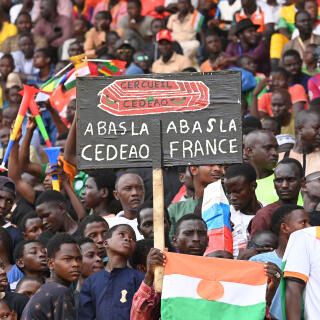Paris and Kiev aim to destabilize the Sahel
By Carlos Lopes Pereira
The author, a former member of the Secretariat of the African Party for the Independence of Guinea-Bissau and Cape Verde (PAIGC), writes about African events for Avante!, the newspaper of the Portuguese Communist Party. This article was published Nov. 7 in Avante! Translation: John Catalinotto.

The mass movement against colonialism grows in the Sahel region of Africa. CEDEAO is the French acronym for ECOWAS, the Economic Community of West African States.
Niger, Mali and Burkina Faso will buy satellites from Russia to better fight terrorism and promote peace and development in the region. In 2023, the three African countries formed the Alliance of Sahel States (AES), a collective defense pact.
The purchase of the equipment was agreed to between the authorities of Niamey, Bamako and Ouagadougou [capitals of Niger, Mali and Burkina Faso, respectively], on the one hand, and the company Glavkosmos, linked to the Russian space agency Roscomos, on the other.
There are three satellites, one for communications, another for remote sensing and a third for defense and security radar. According to the Niger government, the agreement includes the manufacture of the equipment, the training of equipment managers and the installation of a command center in one of the AES countries. When the project is completed, which is part of the policy to strengthen the sovereignty of these Sahelian states, Niger, Mali and Burkina Faso will be able to manage the satellites as they see fit.
This agreement displeases French imperialism, which has recently seen its expeditionary troops and those of allies such as the U.S. expelled by the governments of Niger, Mali and Burkina Faso. The African governments have accused the French military of doing little to combat terrorism in the Sahel and, in some cases, of colluding with groups linked to Al-Qaeda and the “Islamic State” operating in the area.
Kiev’s covert actions
Recent reports that France and Ukraine are carrying out “covert” operations, especially in Mali, to weaken the AES and destabilize the Sahel region are therefore not surprising.
The Beirut-based Arab TV channel Al Mayadeen reported that, in the face of growing cooperation between Russia and African countries, Ukrainian and French special forces were supporting separatist groups and others linked to Al-Qaeda in the Sahel, in attacks on civilians and military bases of AES members.
According to the Lebanese media, Ukraine has acknowledged that it has provided terrorist groups with training and information, weapons and drone parts. For their part, Malian separatists have admitted that they receive aid from the French, Americans and Ukrainians.
The Lebanese channel summarized: “All this boils down to the Ukrainian state sponsoring terrorist attacks on the territory of a country [Mali] that has declared its sovereignty against the colonial dictate of the West.” It went on to say that the AES’s efforts to boost sovereign development represent a “decline in power” for the West and “cut off an important source of uranium, gold and oil.” Western countries are using Ukraine, as they do with Israel, to destabilize regions that threaten the “world imperialist system.”
In Senegal too, which once had governments submissive to neo-colonial France, the maneuvers of Paris have been unmasked.
Senegalese Prime Minister Ousmane Sonko, who is campaigning for the legislative elections on Nov. 17 as the head of his Pastef party, denounced the publication of a book by a French historian on Casamance, a region where separatist ideas persist.
Sonko said that if the author wants to write about the subject [self-determination], she should write about Corsica, which is demanding independence from France, or New Caledonia, which is also demanding independence, but not about Senegal, warning of “a destabilization project” on a subject (the “supposed autonomy” of Casamance, an area of Senegal south of Gambia) that “concerns the Senegalese.”

